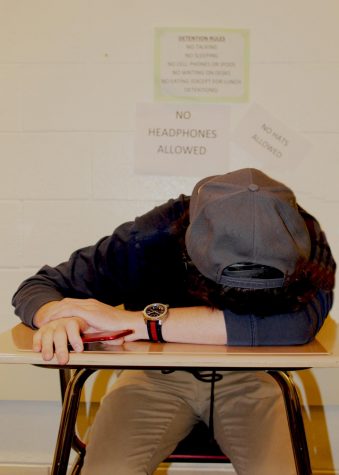Detained in Detention
Almost every stereotypical high school movie includes the daunting detention scene where the students sit impatiently, banging their heads on their desks, pleading to leave. From “The Breakfast Club” to “High School Musical,” the pop culture representation of detention is portrayed as a dreadful, boring, an unproductive time.
Contrary to the movies, the reputation of the LHS detention system is a little different. School officials describe its main priority as being to help students get back on track toward making the right decisions to set themselves up for success. Some find that the system is effective and beneficial in correcting mistakes, while others view it differently.
Productive Punishment

After being issued by a staff member, the colored detention slips float through the hallways from the LSTs before they land in the hands of the students held responsible. The students then venture down to the detention room on their assigned day, located by the Studio Theater. With no windows in sight, the room is dimly lit, but the students are met by a smiling detention room monitor and a member of the security team, Mrs. Sheryl Barbian.
Depending on the severity of the situation and what led to the detention, the time spent in detention varies for each individual student.
“There is a morning detention and after-school detention, which are generally for people who are late to school,” Mrs. Barbian said. “There’s lunch detentions, which people can serve if they have permission, but generally it’s for seniors. Then, Saturday detentions are for kids who maybe missed their detentions.”
According to the LHS student handbook, “Students have two days to complete their tardy detentions. Failure to serve these detentions, will result in a Saturday Detention.” In some cases that involve more severe behavior or transgressions, a student might directly be given a Saturday detention instead of one during the week.
The before-school and after-school detentions last for 30 minutes, while the ones on Saturdays are for either two or four hours. No matter what time frame the student serves in detention, they follow the same routine when they enter.
“They have to come in, put their phones in a tray, then sign in and then they can come in and do their homework. They can use their Chromebooks for schoolwork, too,” Mrs. Barbian explained.
She also discussed that while the students may not want to be spending time in detention, they all seem to use their time efficiently and productively by completing their school assignments.
Senior Mary Lothspeich can attest to this as she described detention as “a welcome break from [her] chaotic day.” She has received multiple detentions for being late to class.
“I’m incredibly productive in detention because there are absolutely no distractions from my work. It’s quiet, I have a clear place to work and I can’t have my phone or friends distracting me,” explained Lothspeich in an email interview.
While most detentions are minor mistakes in a student’s academic career, there are some cases where it becomes necessary for more administrators, such as Mr. Sean Ferrell, to step in. Mr. Ferrell is one of Libertyville’s team directors; he works in the Q-Z LST.
“[Detentions] are kind of part of the learning system, the reflection system. When someone makes a mistake, we would assign them a detention,” he said. “Hopefully, they would reflect on that time and what they have done and make better decisions in the future.”
During Mr. Ferrell’s 15 years spent working at LHS, he has noticed a decrease in the amount of detentions given out to students, which he credits to having genuine “kids that do the right thing” at Libertyville.
Both Mrs. Barbian and Mr. Ferrell agreed that a lot of the detentions handed out to students are due to them being late to class.
“I would definitely say that [tardies] are the most common detention. With that, we are just trying to enforce good habits with being on time. Timeliness is a good habit,” stated Mr. Ferrell.
With the exception of some regular students, they both believed that usually once a student receives a detention, they try to correct their habits and not come back, which is what the faculty and administrators like to see in students.
No Fear, No Change

While the exact statistics on types of detentions could not be shared for this article, school officials agreed that the most common type is tardy detentions before first period.
The student handbook states that “Students will be issued detentions for tardiness at the discretion of the teacher.” But according to Mrs. Melissa Aubin, LHS English teacher, “I think it would make it much easier for teachers to enforce the policy if there was a set standard policy, and I also think it would be better for the kids to have consistency.”
Every year of high school, students have a different set of teachers, and some of the students and teachers interviewed agreed it can become frustrating and confusing that in one class, a student is able to be five minutes late and not get a tardy detention, but if they’re not in their seats by the bell in another class, they will get a detention.
Science teacher Mrs. Tiffany Owens also agreed there should be a set rule because “I don’t think tardiness is necessarily a behavioral problem, so I think there should be a consistent policy so then it wouldn’t be a surprise when a student got a detention from one teacher compared to another.”
Along with the problem of their inconsistent nature, tardy detentions pose another question: Do they actually motivate students to get to school on time?
Sophomore Katlyn McQuillen explained that “[she isn’t] thinking about the possibility of a detention if [she is] running late. Some teachers see it as disrespectful if a student shows up a minute or two late, and that concerns [her] more than the detention itself.”
Lothspeich agreed that the threat of a detention doesn’t change her behavior.
“I try my hardest to get to school on time because I care about my coursework and I don’t enjoy the stress of being late, but detention is definitely not a factor I consider when I’m running to school at 7:28 in the morning.”
Mrs. Owens added that sometimes there are acceptable reasons for being late: “There are always extenuating circumstances, so if students come in with a pass or they’re getting math help, then I don’t even consider those tardies.”
Although tardy detentions make up the majority of detentions as a whole, there are other behavioral issues, such as tobacco use, theft, threats, dress code violations and more that can occur, but those all differ in how they are dealt with. The Student Handbook states that detentions are a viable option for those particular instances, but the punishment is usually customized based on the severity of the action.
Sophomore Scott Sanderson has received a few detentions for violating the dress code by wearing hats, and he said that detentions neither prevent him from wearing hats nor serve as an effective use of time.
“I sit there and look at my Chromebook, and I still wear my hats everyday,” he said.
Sanderson emphasized his point while wearing a hat.






